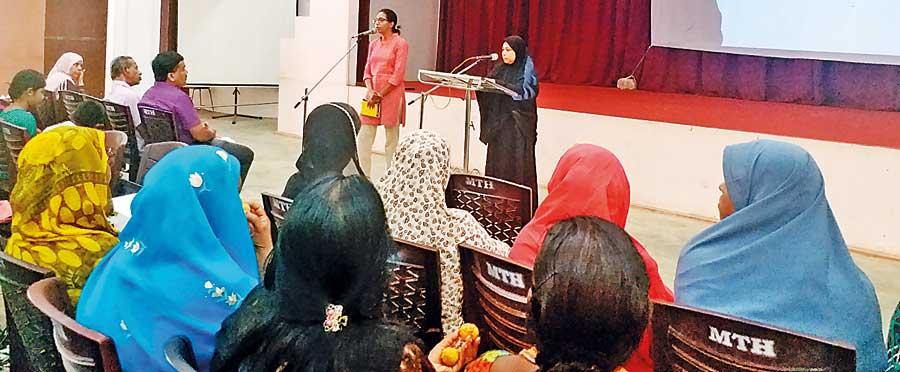Reply To:
Name - Reply Comment
Last Updated : 2024-04-18 22:44:00

- "There have been widespread racist calls to boycott Muslim businesses"
- "Chauvinistic forces unleashed physical violence against the Muslims"
The call for co-existence is paradoxical. Is it a call for a return to a past where communities co-existed? Or is it a call for imagining new forms of existing together in the future? And can such co-existence be constructed, or does it evolve through social, economic and political relations over time? 
On the other hand, the attacks waged by chauvinist forces are increasingly polarising the country. These attacks targeting Muslims and spreading rumours about the Muslim community among the other ethnic communities have a clear agenda of isolating the Muslim community. In this context, there is the need for an ideological struggle against such forces of polarisation and confront them with discourses of pluralism and democracy. Such an ideological struggle for coexistence is the first and most important wall of defence against chauvinist attacks, as violence once unleashed begins a deteriorating spiral of devastation that we know from our tragic history.
As the country is troubled by such inter-ethnic fissures the role of the state has historically been problematic. Indeed, there is considerable evidence of state complicity in many of the ethnic pogroms of the past. The modern state is defined as an institution that has a monopoly on the legitimate use of violence. Individuals or social institutions are legally forbidden to use violence on another individual or community. However, the police and the military that come under the state are legally sanctioned for purposes of law enforcement and national security to use force, as well as to detain individuals and restrict their freedoms.
In this way, if modern states have monopolised powers of violent force, Sri Lanka is now facing a grave danger, as there are moves now to implement the death penalty after forty three years. The death penalty is an unacceptable escalation of the violent powers of the state, where the very existence of a person is at stake, and their lives are legally ended. Giving such powers of life and death, or existence itself to the state, is also among other things a grave attack on any conception of coexistence.
 The struggle for co-existence is about resistance to such attacks on collective and individual forms of existence as well as building solidarity. In this context, the Jaffna People’s Forumfor Coexistence organised a two day discussion in Jaffna over the weekend on June 29 and 30. The event with the participation of large numbers of women from many parts of the country including Puttalam, Batticaloa, Ratnapura, Peradeniya and Colombo, began with the screening of short films made by mainly young film makers from the East. Four short films titled ‘Abaya’, ‘Hartal’,‘Crossing the Muslim Street’ and ‘Fake ID is Watching You’ initiated lively discussions. As this column was written amidst ongoing discussions, I reproduce here the statement released by the Forum at the outset on June 29, 2019, which calls for similar dialogues on coexistence in other parts of the country.
The struggle for co-existence is about resistance to such attacks on collective and individual forms of existence as well as building solidarity. In this context, the Jaffna People’s Forumfor Coexistence organised a two day discussion in Jaffna over the weekend on June 29 and 30. The event with the participation of large numbers of women from many parts of the country including Puttalam, Batticaloa, Ratnapura, Peradeniya and Colombo, began with the screening of short films made by mainly young film makers from the East. Four short films titled ‘Abaya’, ‘Hartal’,‘Crossing the Muslim Street’ and ‘Fake ID is Watching You’ initiated lively discussions. As this column was written amidst ongoing discussions, I reproduce here the statement released by the Forum at the outset on June 29, 2019, which calls for similar dialogues on coexistence in other parts of the country.
“The Easter attacks targeting Christian places of worship and hotels have created deep fissures in the country. Even as the bereaved families and friends continue to remember the loss of their loved ones and care for the injured, chauvinistic forces have unleashed physical violence and ideological campaigns against the Muslims. The targeted attacks on Muslim communities over the past decade have escalated in the months after the Easter attacks.
While many of us are still trying to make sense of the tragic incidents of April 21, 2019, the events orchestrated by divisive forces are posing a threat to the socio-cultural, economic and political existence of the Muslims in Sri Lanka. Misogynistic forces within all communities have turned their repressive gaze on Muslim women’s mobility and attire. The state has issued regulatory instructions on women’s dress without having any serious consultations with women. There have been racist calls to boycott Muslim businesses. Muslim workers who rely on daily wages and small informal industries for their living have been subjected to physical and psychological abuse. These worrying developments are harmful to our society and the country’s economy.
Recognising the importance of strengthening voices for unity among communities during the recent crisis, many individuals and groups came together to form the Jaffna People’s Forum for Co-existence. Respecting social diversity and celebrating the pluralist character of our polity are essential features of coexistence. As communities that share territories and resources, we depend upon one another for our security and collective well-being. The strength of our relationship with one another plays a decisive role in creating a violence-free society and ensuring our future existence. We have gathered here today in the hope that voices calling for coexistence will be heard aloud and similar discussions will take place in many parts of the country.
All our communities have their own histories. However, we should remind ourselves that these histories continue to evolve and are in state of flux. Accepting diversity and change while strengthening the aspects that connect us is essential for coexistence. Internal violence and oppression along lines of class, caste, religion, culture and gender are present within all communities. There are voices within different communities and resistance movements that have been challenging these types of structural oppression. As a group that upholds coexistence, we express our commitment to strengthen and support struggles against all forms of oppression, marginalisation and exclusion.
The current juncture requires us to work collectively towards resisting forces that promote divisive politics in the country. In order to fulfil this historic duty, we call upon everyone to join us on our journey to create and strengthen groups and discourses that strive for and promote coexistence.”

Add comment
Comments will be edited (grammar, spelling and slang) and authorized at the discretion of Daily Mirror online. The website also has the right not to publish selected comments.
Reply To:
Name - Reply Comment
On March 26, a couple arriving from Thailand was arrested with 88 live animal
According to villagers from Naula-Moragolla out of 105 families 80 can afford
Is the situation in Sri Lanka so grim that locals harbour hope that they coul
A recent post on social media revealed that three purple-faced langurs near t

10 Apr 2024
09 Apr 2024